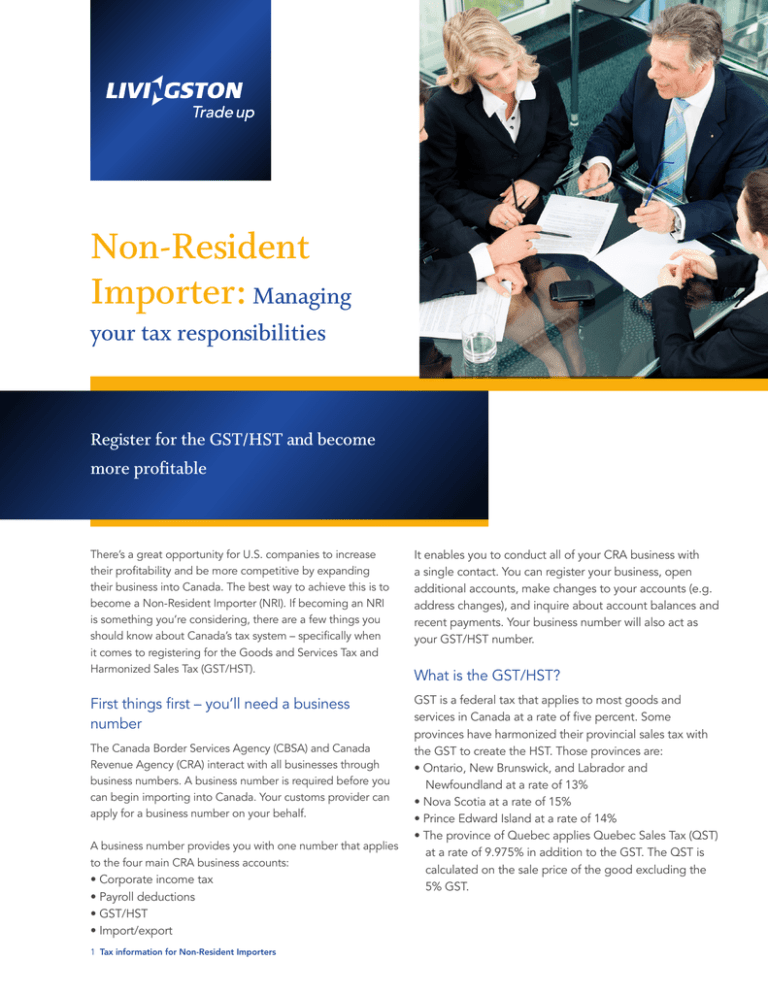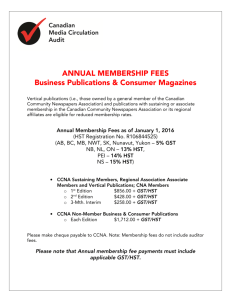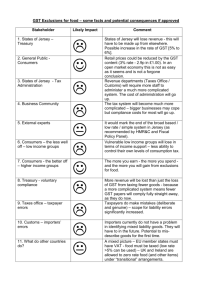Non-Resident Importer: Managing
advertisement

Non-Resident Importer: Managing your tax responsibilities Register for the GST/HST and become more profitable There’s a great opportunity for U.S. companies to increase their profitability and be more competitive by expanding their business into Canada. The best way to achieve this is to become a Non-Resident Importer (NRI). If becoming an NRI is something you’re considering, there are a few things you should know about Canada’s tax system – specifically when it comes to registering for the Goods and Services Tax and Harmonized Sales Tax (GST/HST). It enables you to conduct all of your CRA business with a single contact. You can register your business, open additional accounts, make changes to your accounts (e.g. address changes), and inquire about account balances and recent payments. Your business number will also act as your GST/HST number. First things first – you’ll need a business number GST is a federal tax that applies to most goods and services in Canada at a rate of five percent. Some provinces have harmonized their provincial sales tax with the GST to create the HST. Those provinces are: •Ontario, New Brunswick, and Labrador and Newfoundland at a rate of 13% •Nova Scotia at a rate of 15% •Prince Edward Island at a rate of 14% •The province of Quebec applies Quebec Sales Tax (QST) at a rate of 9.975% in addition to the GST. The QST is calculated on the sale price of the good excluding the 5% GST. The Canada Border Services Agency (CBSA) and Canada Revenue Agency (CRA) interact with all businesses through business numbers. A business number is required before you can begin importing into Canada. Your customs provider can apply for a business number on your behalf. A business number provides you with one number that applies to the four main CRA business accounts: •Corporate income tax •Payroll deductions •GST/HST •Import/export 1 Tax information for Non-Resident Importers What is the GST/HST? GST is applied at the border to all imported commercial goods destined or supplied to all Canadian provinces. The GST is calculated on the value of the goods (including the value of any customs duties) and is collected by CBSA on behalf of CRA. HST is applied at the border to all imported non-commercial goods destined or supplied to the provinces of Ontario, New Brunswick, Nova Scotia, British Columbia and Newfoundland and Labrador. Do I have to register for the GST/HST? Even though you may not have a permanent establishment in Canada, you may be considered to be “carrying on business in Canada”, in which case, you’d be required to pay GST/HST if your worldwide revenues are more than $30,000 CAD. If you choose not to register for GST/HST, you’ll still be required to pay GST to Customs when importing your goods. A non-registrant is not legally allowed to collect GST, however you should include the GST/HST in the selling price as a cost (GST/HST must not be shown as a separate line item on the commercial or Canada Customs Invoice). You can get more detailed information about business numbers and GST/HST from CBSA’s website at www.cbsa-asfc.gc.ca. While it may seem complicated, taking your business across the border doesn’t mean you’ll be stuck wading through Canada’s tax requirements and processes on your own. Your customs broker can help you with the GST/HST registration application process, and offer assistance in maintaining your books and records, as well as the calculation and preparation of your tax returns. If you do register for GST/HST, you’ll need to collect it from your customers on behalf of the Government of Canada. (The GST/HST should be indicated as a separate amount on the commercial invoice.) However, you’ll also be able to claim an input tax credit to recover the GST/HST and put that money back towards your bottom line. Contact your Livingston account executive e-mail us at solutions@livingstonintl.com or give us a call at 1-800-837-1063 Visit www.livingstonintl.com 2 Tax information for Non-Resident Importers




